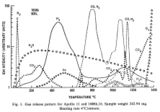Difference between revisions of "Featured Articles"
Jarogers2001 (talk | contribs) |
Jarogers2001 (talk | contribs) |
||
| Line 6: | Line 6: | ||
==Previously Featured Articles== | ==Previously Featured Articles== | ||
| − | + | ===Featured article: [[Sintered regolith]]=== | |
| + | [[Image:MLS1_Brick.GIF|160px|left]] Sintered [[regolith]] falls into the category of ceramic materials as sintering is the process most common to ceramics. When bricks are made from clay on Earth, first the bricks are heated long enough and hot enough to drive out the water. Then the heating is increased to cause partial melting or vitrification which results in the edges of adjacent grains being bonded together once they have cooled. The unmelted particles provide a stable shape and size during the process which involves some shrinkage and a decrease in porosity. | ||
| + | |||
| + | Experiments in radiant heating of regolith simulant have been carried([[Sintered regolith|read more]]) | ||
Revision as of 05:02, 5 August 2008
Contents
Currently Featured Article
Featured article: Volatiles
The primary resource of value to humans on the Moon is the volatile components found in the regolith. These are all the components that are gases at room temperature. Most of the volatiles have been deposited in the top layers of the Moon's surface by the solar wind over geologic time. A notable exception to this is Argon. the concentration of Argon in lunar soil is much higher than found in the solar wind, so must come from a different source. Especially, the isotope Argon-40. It is presently believed that the Argon-40 comes from radioactive decay of Potassium and/or Krypton deep within the lunar mantle or core(read more)
Previously Featured Articles
Featured article: Sintered regolith
Sintered regolith falls into the category of ceramic materials as sintering is the process most common to ceramics. When bricks are made from clay on Earth, first the bricks are heated long enough and hot enough to drive out the water. Then the heating is increased to cause partial melting or vitrification which results in the edges of adjacent grains being bonded together once they have cooled. The unmelted particles provide a stable shape and size during the process which involves some shrinkage and a decrease in porosity.
Experiments in radiant heating of regolith simulant have been carried(read more)








